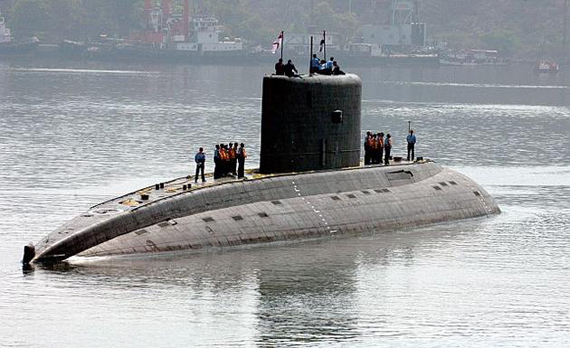
Mumbai, Aug 14: "I feel sad about those Navy personnel who lost their lives for the country," Antony told reporters outside Parliament.
In a major setback to the Indian Navy, a submarine caught fire after a massive explosion and sank in the dockyard here early on Wednesday, with the fate of 18 personnel, including three officers, on board remaining uncertain.
The explosion resulted in a major fire breaking out on board INS Sindhurakshak, a Russian-made Kilo class submarine of the Indian Navy, shortly after midnight, they said.
The fate of 18 persons on board the 2,300 tonne submarine, powered by a combination of diesel generators and electric batteries, is being ascertained, a defence spokesperson said. The Navy has ordered a board of inquiry to probe the explosion and subsequent fire in the submarine, he said.
Fire tenders from the Naval dockyard as well as the Mumbai Fire Brigade were immediately pressed into action, he said.
However, due to the explosion, the submarine has submerged at the dock with only a portion visible above the surface, a defence statement said.
TV footage of the incident showed a huge ball of fire triggered by the explosion lighting up the night sky in Colaba area where the Navy dockyard is located.
The statement said efforts are on to ascertain the safety of the personnel and salvage the submarine.
Navy chief Admiral D K Joshi is on his way to Mumbai. The submarine had returned after a major upgrade programme in Russia 3-4 months ago and was capable of carrying a potent weapons package including the anti-ship 'Club' missiles.
INS Sindhurakshak was not on active duty at the time of the accident, Navy sources said.
The incident has come at a time when the Navy is faced with a depleting submarine fleet.
Commodore (retd) Uday Bhaskar, a former IDSA director, said since the rate of induction of new platforms has not kept up with the kind of wear and tear that a submarine would undertake, the net result is that the Navy's submarine fleet is depleting and the operation load is increasing.
"The fact that the Sindhurakshak (incident) has happened, it is going to have its own adverse impact," he said.
In Delhi, defence minister A K Antony briefed Prime Minister Manmohan Singh about the mishap. Antony told reporters in Parliament that he will be going to Mumbai on Wednesday.
Vice Admiral (retd) A K Singh said an internal explosion in a submarine could be caused by either material failure or by not following standard operating procedure.
He said he suspected that hydrogen gas generated during charging of the batteries of the submarine could have led to the fire which could have spread to the missile compartment area of the warship, causing the massive explosion.
In 2010, a fire broke out on board INS Sindhurakshak leaving a sailor dead and two others injured. That mishap was caused by an explosion in its battery compartment.
India had bought the submarine from Russia as part of a deal in the early 1980s and the warship was commissioned in 1997. It was the ninth of the 10 'Sindhugosh' class diesel- electric vessels that the Navy has in its 16-strong submarine fleet.
In the last few years, there have been several mishaps involving naval vessels. In 2008, another vessel of the Kilo class, INS Sindhugosh, collided with a merchant vessel off Mumbai while participating in a naval exercise.
In 2011, a surface warship INS Vindhyagiri caught fire when it collided with a merchant vessel near the Mumbai harbour while returning from a picnic with families of group of officers deployed on board.
On its way back, it hit another ship leaving the harbour. Nobody was injured but the warship was virtually ruined.





Comments
Add new comment